

Flocabulary - Educational Hip-Hop. Vocabulary Games. English Language Games. Strong vocabulary is one way children develop their English skills as they grow.
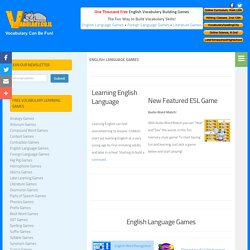
Vocabulary can be developed through books, reading, and writing. When children read literature, those books help children to develop strong vocabulary skills and, in turn, their English skills also grow. Games can be a wonderful resource for building vocabulary for English language learners. Using vocabulary games can strengthen skills already in place or develop new skills yet to be learned.
ESL students can use vocabulary games to help strengthen their English skills as well. Many teachers find games to be a strong classroom tool for foreign language students. Homeschoolers looking for ESL language learning help can find great resources and games for free. Connecting Word Meanings Through Semantic Mapping. Semantic maps (or graphic organizers) are maps or webs of words.

The purpose of creating a map is to visually display the meaning-based connections between a word or phrase and a set of related words or concepts. Semantic maps help students, especially struggling students and those with disabilities, to identify, understand, and recall the meaning of words they read in the text. Learning to create these maps aligns with three of the ELA Common Core State Standards: Teaching students to use semantic maps You can provide your students with direct instruction on how to use semantic maps. Pick a word you don’t know from a text you are reading and mark the word. With direct instruction and repeated practice, struggling students will find that using semantic maps is a very good way of expanding their vocabulary.
Integrating technology There are many technology tools that can help students create semantic maps (including thinking maps, mind maps, bubble maps, and concept maps). Mr. Mr. Word Analysis to Expand Vocabulary Development. Introduction When students engage in "word analysis" or "word study," they break words down into their smallest units of meaning — morphemes.

Each morpheme has a meaning that contributes to our understanding of the whole word. Word Analysis - Teach With Tech. Quick View: Captioning (Get More Info) Resource Type: Quick View Captions can provide struggling readers with additional print exposure, improving foundational reading skills.
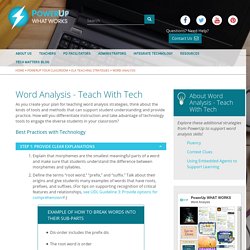
In a typical classroom, a teacher may find many students who are struggling readers, whether they are beginning readers, students with... Quick View: Embedded Supports to Differentiate Instruction for Struggling Students (Get More Info) To ensure that your students are college and career ready, you may need to incorporate a variety of supports into your English Language Arts (ELA) instruction, including Universal Design for Learning (UDL), explicit instruction of evidence-based... Quick View: Using Multimedia to Support Reading in Social Studies (Get More Info) (Watch the Video) As students advance to upper elementary grades, there is a shift from "learning to read" to "reading to learn", particularly with regard to content-area reading in history, social studies, and science.
InfrmlAssess VocabDvlpmnt. 7 Ways to Teach Word Analysis Every Day - Alyssa Teaches. One of my favorite fourth grade language arts units to teach is word analysis.
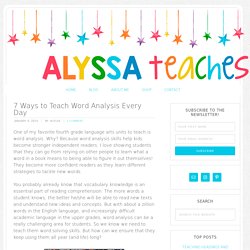
Why? Because word analysis skills help kids become stronger independent readers. I love showing students that they can go from relying on other people to learn what a word in a book means to being able to figure it out themselves! They become more confident readers as they learn different strategies to tackle new words. You probably already know that vocabulary knowledge is an essential part of reading comprehension.
It’s All About That Spiral The approach that has worked best for me is to spiral, spiral, spiral. This means TONS of reading, exposure to unfamiliar words, direct instruction of vocabulary words, and revisiting all those word solving skills daily. What Are Word Analysis Skills? Okay, before I go much further – word analysis is basically word study. Frayer Model. Frayer model vocbulary strategy handout copy 3. Five Research-Based Ways to Teach Vocabulary. Did you know that typically, only 5% to 10% of instructional time is devoted to vocabulary instruction, yet students, especially struggling students and English learners (ELs), need between 12 and 14 exposures to words and their meanings to fully learn them (Durkin, 1978/79; Roser & Juel, 1982; Scott, Jamieson, Noel, & Asslin, 2003)?
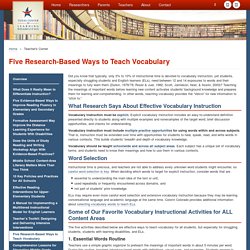
Teaching the meanings of important words before learning new content activates students' background knowledge and prepares them for learning and comprehending. In other words, teaching vocabulary provides the “Velcro” for new information to “stick to.” What Research Says About Effective Vocabulary Instruction Vocabulary instruction must be explicit. Explicit vocabulary instruction includes an easy-to-understand definition presented directly to students along with multiple examples and nonexamples of the target word, brief discussion opportunities, and checks for understanding. Vocabulary should be taught schoolwide and across all subject areas. Classroom Vocabulary Assessment for Content Areas. Osa (all names are pseudonyms) teaches third grade in a high-poverty urban setting with a diverse population that includes a majority of children of color and a high percentage of English-language learners (ELLs).
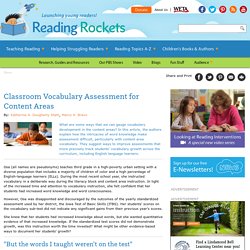
During the most recent school year, she instructed vocabulary in a deliberate way during the literacy block and content area instruction. In light of the increased time and attention to vocabulary instruction, she felt confident that her students had increased word knowledge and word consciousness. However, Osa was disappointed and discouraged by the outcomes of the yearly standardized assessment used by her district, the Iowa Test of Basic Skills (ITBS). Her students' scores on the vocabulary sub-test did not indicate any significant gains from their previous year's scores. She knew that her students had increased knowledge about words, but she wanted quantitative evidence of that increased knowledge.
"But the words I taught weren't on the test" SRAI Vocab Reutzel Cooter.